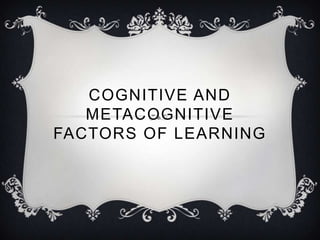
Cognitive and metacognitive
- 1. COGNITIVE AND METACOGNITIVE FACTORS OF LEARNING
- 2. 1. NATURE OF THE LEARNING PROCESS The learning of complex subject matter is most effective when it is an intentional process of constructing meaning from information and experience.
- 3. 2. GOALS OF THE LEARNING PROCESS The successful learner, overtime and with support and instructional guidance, can create meaningful, coherent representation s of knowledge.
- 4. 3.CONSTRUCTION OF KNOWLEDGE The successful learner can link new information with existing knowledge in meaningful ways.
- 5. 4. STRATEGIC THINGKING The successful learner can create and use a repertoire of thinking and reasoning strategies to achieve complex learning goals.
- 6. 5.THINKING ABOUT THINKING Higher strategies for selecting and monitoring mental operations facilitate creative and critical thinking.
- 7. 6. CONTEXT OF LEARNING Learning is influenced by environmental factors, culture, technology, and instructional practice.
- 8. DEVELOPING METACOGNITION Metacognition appears to be one of the most powerful predictors of learning. Metacognition is thinking about thinking, knowing “what we know” and “what we don’t know”.
- 9. T H E B A S I C M E TA C O G N I T I V E S T R AT E G I E S A R E : 1. Connecting new information to former knowledge. 2. Selecting thinking strategies deliberately. 3. Planning, monitoring, and evaluating thinking processes. 4. A thinking person is in charge of her behavior.
- 10. M E TA C O G N I T I V E K N O W L E D G E AND SKILLS Being aware of one’s own learning and memory capabilities and of what learning tasks can realistically be accomplished. Knowing which learning strategies are effective and which are not. Planning an approach to a learning task that is likely to be successful.
- 11. Using effective learning strategies. Monitoring one’s present knowledge state. Knowing effective strategies for retrieval of previously stored information.
- 12. S T R AT E G I E S F O R D E V E L O P I N G M E TA C O G N I T I V E B E H AV I O R 1. Identifying “what you know” and what “you don’t know. 2. Talking about thinking. 3. Keeping a thinking journal. 4. Planning and self-regulation. 5. Debriefing the thinking process 6. Self-Evaluation.
- 13. DISTINCTION BETWEEN C O G N I T I V E A N D M E TA C O G N I T I V E L E A R N I N G S T R AT E G I E S Cognitive and Metacognitive strategies and skills are closely related in terms of them both involving cognition and skill but they are conceptually distinct in at least one major way. Weinstein and Meyer state that a cognitive learning strategy is a plan for orchestrating cognitive resources, such as attention and long term memory to help teach a learning goal. This indicate that there are several characteristics of cognitive learning strategies, such as being goal-directed, intentionally, invoked, effortful, and are not universally applicable, but situation specific.
- 14. metacognitive strategies appear to share most of this characteristic with the exemption of the last one since they involve more universal application through focus upon planning for implementation, monitoring, and evaluation. That is to say metacognitive strategies are not so situation specific but involve generic skills essential for adult, more sophisticated forms of thinking and problem solving.
- 15. Establishing the metacognitive and environment A metacognitive environment encourage awareness of thinking. Planning is shared among Teachers, School Library media specialist, and students. Various thinking strategies are discussed while evaluation is on going. in the creation of a metacognitive environment, Teachers monitor and apply their knowledge, deliberately modeling metacognitive behavior to assist student in becoming aware of their own thinking. Metacognitive strategies are already in the Teachers repertoires so they must be alert to this strategies and consciously model them for students .
- 16. problem solving and research activities in all subjects provide opportunities for developing metacognitive strategies. Teachers therefore need to focus attention on how task are accomplish. Process goes, in addition content goes goals, must be established and evaluated with students so that they can discover but understanding and transferring thinking process improve learning.
- 17. The role of metacognitive knowledge in learning, Teaching, and assessing metacognitive knowledge can play an important role in student learning and by implication, in the way student are taught and assessed in the classroom .
- 18. first, metacognitive knowledge of strategies and task as well as self knowledge is link to: • learn and perform in the classroom • Student know about the different kinds of strategies for learning, thinking, and problem solving. • different strategies or memory task (for ex. are more likely to use them to recall relevant information.) • Knows the general strategies for thinking and problem solving (use in confronting in classroom task. )Bransford et. Al, 199; Schneider & Pressley, 1997; Weinstein & Mayer, 1986
- 19. Related to transferring of knowledge … • Ability to use knowledge gained in the situation. • New task required knowledge and skills that they have not yet learned. in this case they are likely too use more general strategies to help the student think about or solve the problem.
- 20. In terms of implication for teaching, It is important that metacognitive knowledge is embedded within the usual content driven lesson in the different subject areas.
- 21. In terms of implication for assessment, it is important to know how it is used by the students to facilitate their own learning. In this sense, it is more likely that any assessment of metacognitive knowledge by Teachers will be informal rather than formal.
